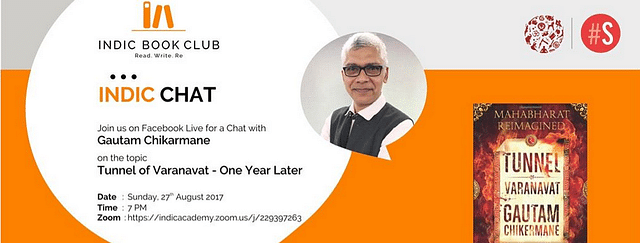
Indic Chat With Gautam Chikermane
Indic book Club is delighted to host Indic Chat on Zoom with Gautam Chikermane, author, Tunnel Of Varanavat. Saiswaroopa Iyer, author, Abhaya and Avishi, will be in conversation with him on August 27, here. The chat begins at 7 pm.
In his chat, Chikermane will talk about the Mahabharata, how he engages with the epic, what he tries to do with the Mahabharata, his style, the unknown characters in his book that were not there in Ved Vysya's Mahabharata, Sri Aurobindo, and how Sri Aurobindo's work influences his.
Reimagination of an epic is as cyclical as the process of birth. Timeless text is born and reborn. Reimagination initiates a deep sense of returning to a universe and its wider interpretations. The epic opens itself, layer after layer, to be read and reread, to reveal the written and unwritten. Then, reimagining shapes into a series. A sequence unfolds, taking the readers through the holes, openings and tunnels, of texts they had read and not read, in a renewed action and performance of retelling – a skill in people blessed with the art of reading and rereading. Chikermane is one of them.
His engagement with the Mahabharata deepens every time he tries to answer the unanswered. Chikermane's Tunnel Of Varanavat, written last year, his first fiction, placed Purochana under new light.
The journey Chikermane went through while writing Tunnel Of Varanavat, “remains alive, and may deepen in future books.” He recently attended a workshop on Mahabharata, and this year, the epic stands before him, ready to be interpreted and read afresh. He says, "every time I think I have read and understood the Mahabharata, things happen that tell me I have barely begun. The recent workshop with Professor Vishwa Adluri in Delhi, for instance, is making me approach the text with new perspectives. It is like reading it afresh. And that's what makes the Mahabharata what it is – an eternal and timeless text that engages you, captivates you, engulfs you in its depths, carries you to its heights and widens you to its span."
What is the Mahabharata?
"Mahabharata is the universe I live in, and which lives in me. To me the Mahabharata is way beyond a story, a history, a literature. I see it being played out everywhere – in foreign policy, in justice, in dharma, artha, kama and moksha. It is there in every incident and will be in future. It is an anchor in the stormy seas of life."
The constant urge to rewrite comes wrapped within the urge to reread and reinterpret. Chikermane views Tunnel Of Varanavat from behind his thick glasses and his sharp eye for economics and detail. He says, "I am mostly satisfied, but after a year, the feeling of exhilaration has gone and I can see blemishes in my work. I could have done better. That said, some parts are so living that I wonder if I wrote them. This year, I have engaged even more deeply with the text and realise that it would be a constant and life long journey to a perfection that may never come."
Currently, he is reading On the Meaning of the Mahabharata by V S Sukthankar, Tantu by S L Bhyrappa and India Transformed: 25 Years of Economic Reforms by Rakesh Mohan. "In recent times, mythological fiction is expressing itself in the English language. K M Munshi's seven-book Krishnavatara series was probably the first that attained a mass following. The next jump came with Ashok Banker's brilliant and forceful eight-book retelling of the Ramayana. And with Amish's Shiva Trilogy, the 'market' just exploded. This will continue as new authors examine these eternal texts and stories, with contemporary themes and modern expressions," he adds. Chikermane is writing. "There are two themes I'm working on, one, a fiction continuing my Mahabharata Reimagined series, and the other, a non-fiction. Let's see which emerges first," he adds.
What does he think of mythological fiction? "It had always been a living literary companion to every Indian. Which citizen doesn't not know the story of Ramayana and the Mahabharata? These two texts guide us, live in us – are us. They are our cultural heritage, a spiritual inheritance, a genetic state of being. From Amar Chitra Katha comics to sophisticated Sanskrit treatises, mythology has accompanied us in our growing years."
Chikermane knows the counters of mythological fiction. He recently interviewed Amish Tripathi on Sita: Warrior of Mithila, introducing a Sita we have not met before, interpreting Amish's engagement with language, material and gender in their interaction. What do Amish's Sita, Saiswaroopa's Abhaya and his Urvashi reveal? "Their strength, inner and outer. All these three characters have created spaces for themselves in the subtle worlds of our collective imagination. This is how women are – strong individuals with deep compassion. This is how the need to be captured by writers. I wonder where the weak and wailing women we see on our screens come from. My women characters are a reflection of the women I see around me – in my family, my friends, my colleagues, fellow writers, women I know and those I don't. Urvashi is only the first of my several explorations of strong women."
Join Chikermane in the Indic Chat to know more about his universe of the Mahabharata and other texts that shape his writing, reading and rereading.